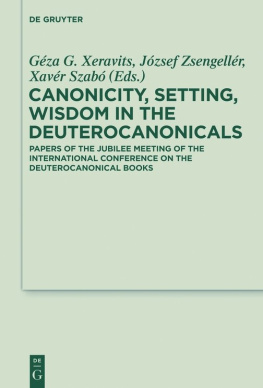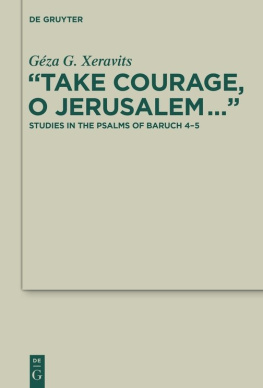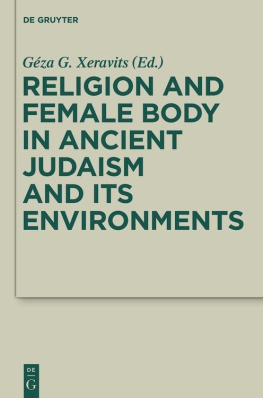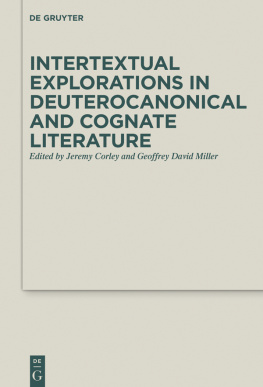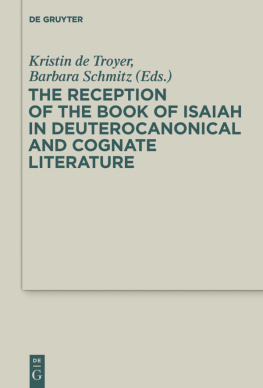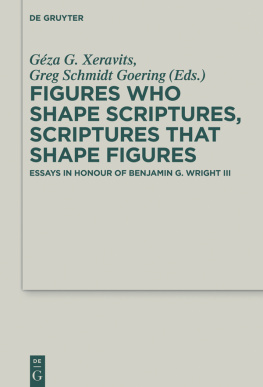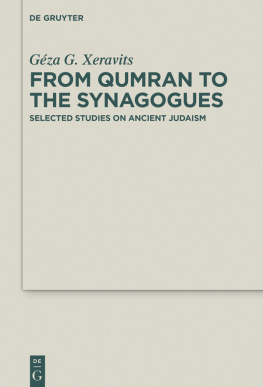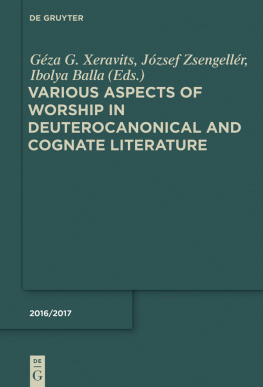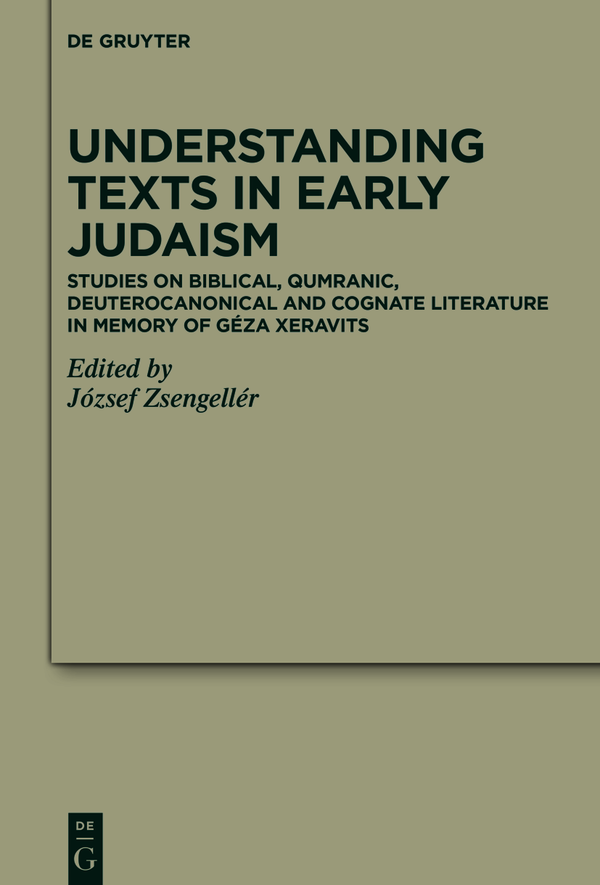Deuterocanonical and Cognate Literature Studies
Edited by
Friedrich V. Reiterer
Kristin De Troyer
Beate Ego
Tobias Nicklas
Volume
ISBN 9783110768367
e-ISBN (PDF) 9783110768534
e-ISBN (EPUB) 9783110768565
Bibliographic information published by the Deutsche Nationalbibliothek
The Deutsche Nationalbibliothek lists this publication in the Deutsche Nationalbibliografie; detailed bibliographic data are available on the Internet at http://dnb.dnb.de.
2022 Walter de Gruyter GmbH, Berlin/Boston

Gza G. Xeravits (19712019)
Preface: In memoriam Gza G. Xeravits (19712019)
It is always a trauma to lose a family member or a close friend, but if it is by way of a dramatic disease, it is a tragedy. Gza was only 48 years old; he leaves behind four kids (bris 20; Sra 18; Dme 15; Rzi 11) and a wife (Kriszta). To be consoled we need to remember. Remember the good days, the time we spent together, the good deeds he did, and for a scholarly community, especially his scholarly legacy. In this volume 25 colleagues and friends have gathered to express our honor, love, and thanks for the life of Gza Xeravits who would be 50 in this year. We remember him as a colleague, scholar, and friend.
As a colleague: Gza Xeravitss career began after his graduation from the Pzmny Pter Catholic University Budapest (1996); he was a lecturer at the Saint Athanas College of the Greek Catholic Church in Nyregyhza, where he worked for two years. After three years of scholarships in Leuven and Groningen (19992002), he started to work at the Reformed Theological College at Ppa as an assistant professor. During his seven years of teaching he defended his PhD thesis in Groningen (2002) and made a habilitation (2008). He was a beloved and popular teacher among the students, and he had an ability to identify those with talent. He became professor in Ppa in 2008. From 2009 he was professor and chair of Biblical Studies at the Sapientia College of Theology of Religious Orders in Budapest. Between 2015 and 2018 he taught at the Theological Faculty of the Jnos Selye University of Komarno (Slovakia). In his last year (2019), he was employed as research professor at the Theological Faculty of the Kroli Gspr Reformed University Budapest.
As a scholar: Gza Xeravits published his first book in 1995 on the continuous pesharim from Qumran while still in his graduate studies. He founded a Hungarian journal for Biblical Studies in Nyregyhza (Studia Biblica Athanasiana), which he edited until his death. His interest in the Dead Sea Scrolls was continuous and resulted in his PhD dissertation on the eschatological protagonists of the Yahad community and further in several articles, an introductory monograph, and an edited book. In Old Testament literature his favorites were the books of Isaiah, Daniel, and Psalms. He wrote several articles about them and an exegetical monograph about the pilgrim psalms. During his years in Ppa his interest turned to the deuterocanonical literature, and he published ten volumes of the proceedings of the international conferences on this literature in Ppa and Budapest (some of them with collaboration of the present author). He founded a monograph series on Deuterocanonica with five published books. He also wrote a monograph on the Book of Baruch. At the Sapientia in Budapest, he started a monograph series of the chair of Biblical Studies, which numbered twelve books during his time. In his last years he concentrated on the interpretation of the iconographic decorations of the Jewish synagogues in Antiquity and published several articles on the topic. Altogether he published 3 English, 1 German and 14 Hungarian books, 15 English and 10 Hungarian volumes as editor or co-editor, and 40 English, (French and German) and 73 Hungarian articles in books and journals (see his bibliography in this book). In his writings he concentrated primarily on the texts and the topics themselves, and the discussion of the secondary literature was only secondary for him.
Gza organized a series of ten international conferences on deuterocanonical literature concentrating first on individual books and later on different common characteristics and themes. From 2010 he was the vice president of the Society of Hungarian Hebraists. His scholarly work was acknowledged with the Jzsef Schweitzer award in 2019.
As a friend: Gza was very open. After the first meeting with him, one felt as if he were an old friend. He enthusiastically discussed all personal, religious, cultural, political, or scholarly topics with others. He not only wanted to share his own ideas with his friends and conversation partners, but he was really interested in how the others thought about the world. On the other hand, he was very extroverted and wanted to involve his friends in the knowledge he had of a very wide range of topics, from the culinary and wine specialties of different regions in Hungary to the cultural particularities of the Armenian or the Dutch people. His style of storytelling was entertaining and enlightening, and he had a great sense of humor. The less hair he had over the years, the greater his beard grew. Some of these characteristics were mentioned by some of the contributors of the present volume.
Twenty four papers of twenty five colleagues commemorate Gza Xeravits in this volume, but several other colleagues expressed their emotions and good memories of him, even if they could not deliver a paper. Just to mention some of them: Stefan Schorch, Eibert Tigchelaar, Michael Duggan, Nicholas Allen, Stefan Reif, Renate Egger-Wenzel, Marcus Witte, Eugen Ulrich, Sidnie White Crawford, Oda Wischmeyer, Marko Martilla, Ulrike Mittmann, George Brooke, Kristin de Troyer, Candido Don Dionisio. Hungarian colleagues will commemorate him with a Hungarian volume.
In his short life Gza Xeravits was a fruitful scholar, he, however, could not show all the truth as the angel Raguel in the book of Tobit does, but he always tried to reveal with due honor the works of God (Tob 2:11). Although we are sad that he is not with us anymore, according to our belief, all of the works and secrets of God are already revealed to him for eternity.
Jzsef Zsengellr
Part 1: Old Testament and Early Judaism
From the Heavens, From the Earth
Structure and Messages of Psalm 148
Thomas Hieke
Abstract
This paper demonstrates that the poetic beauty of Psalm 148 becomes an ethical challenge when confronted with our contemporary problems. It uses a reader-oriented and text-centered methodology in order to describe the structure and content of this biblical text, its individual features and its typical traits shared with other texts, its context within the Psalter as well as within the Hebrew and the Greek Bible, and the messages that emerge from the process of this analytical reading. The imperative calls for praise in Psalm 148 thus become in the present time calls for respect for creation, for the entire cosmos and the ecological balance, which human beings are threatening to an unprecedented extent.
Keywords: Psalm 148, psalms, Hallel, praise of God, todays reading,
Introduction
This contribution on Psalm 148 was composed during the global Coronavirus pandemic, which brings about so much death, suffering, and restrictions of social contacts, as well as during the ongoing climate crisis that threatens life all over the planet; it is dedicated to a friend and colleague who passed away all too early, dear Gza Xeravits, due to a horrible disease. At first sight, there seems to be no reason for praise. Weeping and lament might be more adequate instead of an exegesis of a



